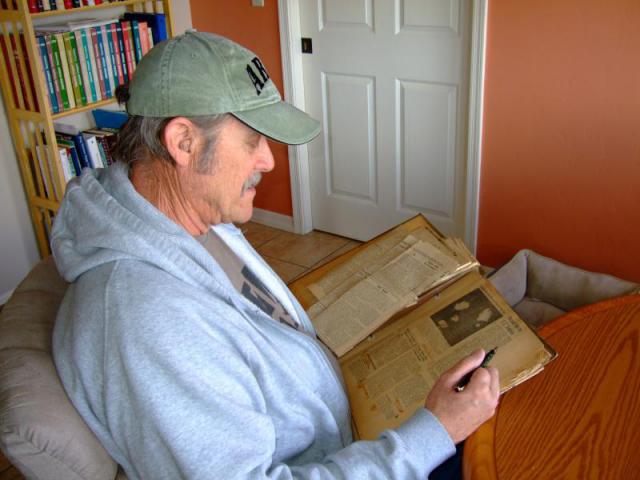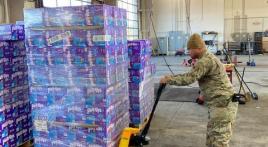The scrapbook is full and overflowing with more than 150 newspaper clippings from four newspapers available to Chester Sheldon during the World War II years. Yellowed and brittle from 75 years of age, they must be handled with great care. His three sons all served in World War II, and Chester clipped and saved everything he read about them, their friends who also served, and everything else about the progress of the war in general.
His grandson, Gary Sheldon found the scrapbook among his own father's possessions, along with more than a hundred letters his dad, Ray Sheldon, wrote to his folks back home from the time he entered basic training until the war's end. A quartermaster NCO, Ray's letters constantly sought to reassure his family that he was doing well and in no danger in his unit "somewhere in Alaska." Later they learned he had served in the Aleutian Islands, at a key defensive post in the war with Japan. In one of Ray's letters home, he told his parents, "You needn't worry about me at all. In the last war only 2 men got killed in the QMC. A bale of hay fell on one, and the other died laughing at him."
Himself a Vietnam veteran, Gary gazes thoughtfully at the family treasures. "I learned a lot from reading these things," he says. "It was sure different then from how it is now, or even from when I was in Nam."
A modest, unassuming man, he never speaks about his own service, except to say that he was an infantry soldier serving with the 1st Infantry Division. He doesn't mention the Bronze Star or Purple Heart awards, but allows me to find the clipping from the late 1960's which was also stuck in Chester's scrapbook. According to the Wausau (WI) Daily Herald, a portion of the citation from his BSM reads thus: "Ignoring his personal welfare, Private First Class Sheldon maneuvered through the hail of hostile rounds to his armored personnel carrier and secured more munitions. He continued to brave the aggressor barrage and distributed resupply ammunition to his comrades until the enemy attack was thwarted. His presence of mind, selfless courage, and determination were instrumental in defeating the insurgent force." The clipping doesn't mention the "V for Valor" that is on the actual medal I found in his box of service memorabilia. There is also an oak leaf cluster, indicating he was awarded a second Bronze Star at some point later in his service. Gary was also promoted to SP4 before his tour of duty was finished.
Chester's scrapbook shows he was extremely proud of his sons. The oldest, Earl, served as a forward observer with a combat battalion in north Africa, and was injured in the battle of Kassarine Pass (Tunisia), when a machine gun round went through his shoulder, passing close to his spine. As he recuperated in an Army hospital, Earl wrote home to reassure his parents that he was doing well, with "good food, sweet nurses and nothing to do but sleep." He also had the amazing coincidence of meeting another Wausau man in the same hospital in north Africa. Although the two men had not known each other at home, they had mutual acquaintances. Earl was later awarded the Legion of Merit and Bronze Star, as well as a Purple Heart. Upon returning home to Wausau after his honorable discharge, Earl was invited to speak to the local PTA about his experiences.
Norman, Chester's middle son, was stationed in Germany with the Third Army. Both he and his brother Ray were promoted to Staff Sergeant before the war ended.
One of the scrapbook clippings features a letter from a Wausau sailor stationed at a Navy Base in Brazil. Apparently Douglas Irick had somehow learned that German prisoners of war who were kept in stateside prisons were being treated much better than American POWs were in Europe. He laments the fact that American girls were "carrying on" with the German prisoners, something he thought disgraceful, and that the prisoners were "eating and living as good or better than our own men."
On the same page in the scrapbook is an article about how "Quick-thinking American and British captives being herded from a German prisoner of war camp at Limburg (Germany) saved themselves from a deadly attack by United States planes through a human alphabet maneuver...by forming lines spelling out the letters PW, for prisoners of war." The pilots saw the message and veered away, minimizing the number of casualties.
In one of his letters home, Ray Sheldon had told his parents about playing touch football during free time. Shortly thereafter, his father saved a full page out of the Chicago Daily Tribune, with a large photo that showed "American fighting men open the football season in the mud of Adak Island in the Aleutians."
Interestingly enough, on the same page was a photo of a young man and woman who had won a rhumba (sic) contest in New York. The caption read "Gilbert Duke, 29, with his rhumba partner. They won a big rhumba contest in New York, but a friend of his wife saw him. Now he is in the brig as a deserter from the Navy."
Another thing Gary noticed in some of the saved newspapers was the low cost of things then, compared with now, or even the late 60's when he served. In May 1943 the Milwaukee Sentinel had a restaurant ad from Lakota's Restaurant and Cocktail Bar, offering a seven course meal for $1.00. In the same block was the notation that the $1.00 dinner was free with every $100 worth of war bonds purchased on the premises.
Perhaps one of the most interesting articles in the Sentinel was published in September 1944, entitled "Veterans Are Grateful to Hearst Newspapers." The following American Legion resolution was published:
"BE IT RESOLVED that the American Legion Department of Washington, in convention assembled, hereby commends the press and particularly William Randolph Hearst and his newspapers throughout the United States for the valuable assistance and effective support in urging the enactment by congress of the servicemen's readjustment act known as the G.I Bill of Rights;
"AND BE IT FURTHER RESOLVED that we commend the press and especially the Seattle Post-Intelligencer, for conducting the campaign for and for providing the means of making long distance telephone calls by sick and wounded members of the armed forces to their loved ones at home."
In early 1945, the Milwaukee Sentinel printed a poem written by Lt. Dean Chatlain while recovering from wounds in an Army hospital in Algeria. Lt. Chatlain had been a tank commander, and when his tank was destroyed he crawled to a nearby fox hole and had to amputate his own foot with a knife. He had been found bleeding and unconscious, but managed to survive. The poem reflects his somewhat pessimistic thoughts about support from Americans back home.
"What did you do today, my friend,
from morning until night?
How many times did you complain
the rationing was too tight?
When are you going to do all those things you say?
A soldier would like to know, my friend,
What did you do today?
"We met the enemy today
and took a town by storm.
Happy reading it will make,
but tomorrow you'll mourn.
You'll read, with satisfaction
a brief communique.
We fought, are you fighting?
What did you do today?
"My gunner died in my arms today,
I feel his warm blood yet.
Your neighbor's dying boy gave out a scream I can't forget.
On my right a tank was hit,
a flash and then a fire.
The smell of burning flesh still rises from the pyre.
What did you do today, my friend
to help us with this task?
Did you work harder, and longer, for less?
Or is that too much to ask?
What right have I to ask you this
You will probably say
But maybe now you'll understand
You see, I died today.
A few days later the Sentinel printed an answer to Lt. Chatlain's poem, penned by Rev. H.C. Stehling, priest of St. Kilian's Catholic Church in Hartford, Wisconsin.
What have I done today, my friend?
I prayed that soon this war might end.
That God, our Lord in Heaven above,
Might keep you ever in His love;
From ills of soul of body free,
Return you safe and sound to me.
And tho it may be just a mite,
I gave a pint of blood tonight.
I bought a bond as I bought bread,
Refused to ride and walked instead.
I salvaged paper, rags and tin,
Some metal scrap, I too sent in.
I'm grateful for the things you've done,
The bitter, bloody battles won,
The time you fought and fought in vain,
Your sorrows, sufferings, all the pain,
The hardships, trials you endured,
Are keenly felt, please be assured.
I know your fight for liberty,
Is, too, a sacrifice for me.
Your wounded gunner's anguished cry,
As he fell in your arms to die,
The stench of burning flesh, the pyre,
The mud and water, jungle, fire,
I tried to feel as you have felt,
You fought, as I in prayer knelt.
I'm just a plain civilian Joe,
Who tried to understand, to know,
To know these things that sere your soul
And wonder, is it worth the toll.
It is; and tho at times you're blue,
Take courage, soldier, to see it through.
For sweetheart, sister, mother kind,
For dad and brother, left behind.
The rank and file at home are true,
Will do and give their all for you.
So buck up, soldier, fight again,
We'll pray at home, it's not in vain.
In keeping with the family tradition, Gary's son Brian served in the Marine Corps, and is now a police officer in his home town of Prescott Valley, Ariz.




